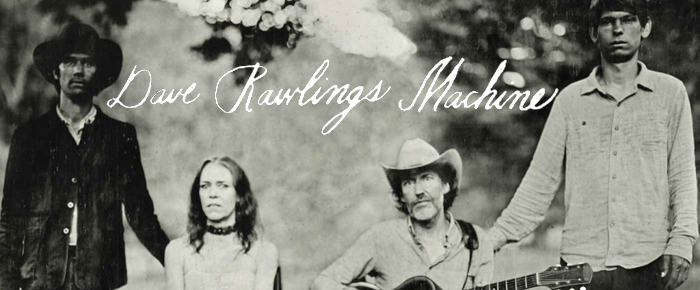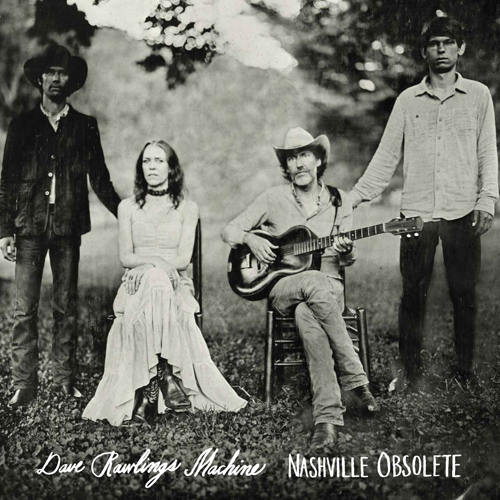
By Eleni P. Austin
Every so often, the Country Music establishment goes through a back-to-basics phase, touting some new artist who embodies the spirit of Country forefathers like A.P. Carter, Jimmie Rodgers and Hank Williams, Jr. In the ‘80s it was k.d. lang, Lyle Lovett and Steve Earle. In the ‘90s it was Marty Brown and Hank Williams, III.
Currently, Chris Stapleton and Sturgill Simpson, (both, coincidently produced by Rival Sons’ producer, Dave Cobb), have been co-opted by Nashville, serving as the latest poster boys for C&W authenticity. The irony is musicians like Dave Rawlings and Gillian Welch having been creating pure and credible Country sounds in Music City’s backyard since the early ‘90s.
Gillian Welch grew up in Hollywood, the adopted daughter of Ken and Mitzie Welch, best known as writers for the Carol Burnett show. At her progressive elementary school she was exposed to the Folk music of Woody Guthrie, Pete Seeger and the Carter Family.
Her aptitude for music was readily apparent and she played in different bands all through high school and college. There was a Goth band, (Penny Dreadful), a Psychedelic Surf band, (Thirteenth Floor Something Or Other), a campy, ‘70s cover band and even a band called Oprah von Sofa. A UCSC housemate re-acquainted her with Bluegrass and Folk and she had an epiphany; this was the music she was meant to create.
Gillian’s parents supported her ambitions and sent her to Boston’s prestigious Berklee College Of Music to study songwriting. It was there she met her life and musical soulmate, Dave Rawlings, as they each auditioned for the country-band class.
Dave Rawlings was born and raised in Rhode Island and spent his formative years listening to Neil Young and playing video games. He bought his first guitar so he could perform in a local talent show. (He played “Heart Of Gold” with a friend chiming in on harmonica). He came to Berklee to study guitar.
The duo began writing and performing music together, crafting their style at local open mic showcases. They relocated to Nashville and signed with a manager. She got them a number of gigs opening for Roots music stalwarts like Peter Rowan. It was at such a show that they were spotted by T-Bone Burnett.
The protean musician/producer had already made a name for himself producing artists like Los Lobos, Elvis Costello and Counting Crows. The duo signed a record deal with Almo Sounds, the boutique label started by Herb Alpert and Jerry Moss after they sold A&M.
Even before their first album arrived, Emmylou Harris heard their song “Orphan Girl” and recorded her version on her 1995 album, Wrecking Ball. Although it was credited solely to Gillian Welch, their debut, Revival was very much a collaboration. Spare and bare-bones, the music transported the listener to another time, conjuring up the Dust Bowl imagery of Dorothea Lange. It garnered critical acclaim and achieved modest sales. It even received a Grammy nomination for Best Contemporary Folk Album.
Hell Among The Yearlings appeared two years later, doubling down on the down-home recipe of their debut. Just as Dave and Gillian began preparations to record their third album Almo Sounds folded.
Luckily T-Bone Burnett had been drafted to create a soundtrack for the Coen Brothers Depression-era comedy, O Brother, Where Art Thou. Gillian and Dave were conscripted along with Emmylou Harris, Ralph Stanley, Alison Krauss and a host of pickers and players.
Like a modern-day Alan Lomax, Burnett acted as a musical archeologist resurrecting forgotten classics like “I Am A Man Of Constant Sorrow,” “O Death” and “I’m In The Jailhouse Now.” Released in late 2000, the music was an integral part of the film, and a surprise hit, actually hitting #1 on the Billboard charts.
It raised the profile of the musicians involved and sparked a mini-renaissance of Blues, Folk, Bluegrass and Country. Re-labeled “Americana,” suddenly, it wasn’t uncommon to find Porkpie-hatted hipsters ironically sipping their lattes to stark murder ballads from the Louvin Brothers or the yodeling sounds of Patsy Montana.
Rather than remain beholden to another label, Gillian and Dave started their own. Acony Records was named for the Acony Bell, the Appalachian wildflower. Time (The Revalator) was the label’s first release and the duo’s third album. Keenly observed and sharply articulated, the record touched on the birth of Rock & Roll, the assassination of Abe Lincoln and the sinking of the Titanic. Reviews were rapturous, sales were brisk and they received another Grammy nomination.
Two years later, in 2003, they reappeared with Soul Journey, their fourth effort that hewed more closely to the Rock & Roll paradigm, adding drums, organ and electric bass. It may have shocked purists, but it felt like a necessary jolt to the status quo.
After an extensive tour, the duo known as Gillian Welch took an extended hiatus from their own music. Dave and Gillian stayed busy, producing albums for Old Crow Medicine Show, Ryan Adams and Robyn Hitchcock, as well as playing with artists as disparate as Sara Watkins, Bright Eyes, Whispertown and the Decemberists.
In 2009, the duo returned as Dave Rawlings Machine, releasing A Friend Of A Friend. Basically, it was a continuation of his collaboration with Gillian, only now Dave was handling lead vocals. But the sound of the album hewed closer to the canyons of Laurel than the hollers of Appalachia.
Finally, another Gillian Welch album arrived in 2011. The Harrow & The Harvest was worth the wait. Warm and intimate, it was the duo’s most richly rewarding effort to date.
After touring relentlessly behind the record, and producing the latest Dawes album, Dave and Gillian had a brief respite. Having re-charged their batteries, the pair is back, this time under the Dave Rawlings Machine moniker, with Nashville Obsolete.
The record opens with “The Weekend.” Powered by spidery acoustic chords, a see-sawing string section and Dave’s reedy tenor, he unfurls a slightly apocryphal tale of weekend plans. “I hit the weekend like a freight, got there early, I couldn’t wait/Made a friend or two along the way, you want the details, what can I say?”
His companions include a ballerina, a foreign cartel, an opera singer and a southern belle. The bacchanal goes slightly awry, and he comes away with some hard won wisdom; “Friday is forever, Saturday flies past, Sunday starts coming down, the good ones never last.” On the instrumental break guitars and strings beautifully flutter and wow, underscoring the song’s bittersweet sentiments.
Both “The Last Pharaoh” and “Candy” employ Johnny Cash’s patented “boom chicka boom” rhythm. The former opens with plucked, stuttery banjo notes that intertwine with guitar and stand-up bass. The lyrics spin a shaggy dog yarn of a gambler looking for a little luck. He insists, “I don’t need a chicken, a chicken in the pot, or a woman in my own backyard/I don’t need no chicken, chicken, chicken, the way I need the next high card!”
The latter is even more playful, as bee-stung fiddle runs connect with loping acoustic licks and thumping bass. The lyrics offer a series of double entendres leaving the listener wondering if the title refers to a woman named Candy or a sugary confection. There is a certain off-the-cuff charm that propels the song, making it easy to forgive the weezy vaudeville hokum of the lyrics
“Bodysnatchers” is a wicked slice of Southern Gothic. Anchored by rippling acoustic guitar and sawing violin the vivid imagery is equal parts “Gone With The Wind” and “The Walking Dead.” Ultimately it’s a cautionary tale; “So when you come around here, you best be waving something white/A pillowcase or a hankerchief ought to get the message right, and you oughta try not thieving in the night/Don’t be a bodysnatcher.”
 The centerpiece of Nashville Obsolete is “The Trip.” Clocking in at nearly 11 minutes it begins with whispery Spanish guitar and a spoken word intro. “Whistles blow and people get on trains without knowing where they’re going…” and we’re off on a Dylanesque ramble. Both the lyrics and melody evoke Folk Rock touchstones like the Byrds’ “Chestnut Mare” as well as Bob’s own score to “Pat Garrett And Billy The Kid.”
The centerpiece of Nashville Obsolete is “The Trip.” Clocking in at nearly 11 minutes it begins with whispery Spanish guitar and a spoken word intro. “Whistles blow and people get on trains without knowing where they’re going…” and we’re off on a Dylanesque ramble. Both the lyrics and melody evoke Folk Rock touchstones like the Byrds’ “Chestnut Mare” as well as Bob’s own score to “Pat Garrett And Billy The Kid.”
Of course the “trip” in question is life. But Dave seems to address Dylan explicitly in a final verse; “Your harmonica is blown baby, throw it away, your denim shirt is ragged and your dirty collar’s frayed/I tried to play my horn for you but I couldn’t find a note, so I picked up pen and paper and this is what I wrote: ‘Go take a trip wherever your conscience has to roam/It’s much too hard to try and leave a light at home.’” A final instrumental coda closes the song with a gorgeous fiddle and guitar pas de deux.
Another highlight is “Short Haired Woman Blues.” Moving at a deliberate pace, the melody echoes the grandeur of the Spaghetti Western scores of Ennio Morricone, with a stately string section adding gravitas. Although the song takes its title from a bluesy Townes Van Zandt track, this Rawlings-Welch original is less acerbic. It operates as something of a cautionary tale, insisting that loving short-haired women will “leave you cryin’.”
The album closes with “Pilgrim (You Can’t Go Home).” Over cascading mandolin runs, pliant rhythm guitar riffs and swooping strings the opening lines proclaim “I won’t get drunk no more no more.”
The rest of the song is a stream of conscious jabberwocky that cryptically weighs in on Rock & Roll, the bible, Columbus, wild flowers native to Indio, Moby Dick and golden calves. On the page it reads like a recipe for disaster, but somehow it works beautifully.
Dave Rawlings produced the album, and Dave and Gillian handled most of the instrumentation. However, they received some help from Paul Kowert on bass, Willie Watson on guitar, Brittany Haas on fiddle and Jordan Tice on mandolin.
Dave and Gillian may never receive more than cursory attention from the Country Music establishment, but that’s probably okay. Outliers like Steve Earle and Lyle Lovett have done just fine without Music City’s approbation.
Nashville Obsolete is another in a long line of brilliantly nuanced records from these two. They may not have grown up in the milieu, but to paraphrase Loretta Lynn, if you’re looking at Dave Rawlings and Gillian Welch, you’re looking at Country.
Another highlight is “Short Haired Woman Blues.”












































